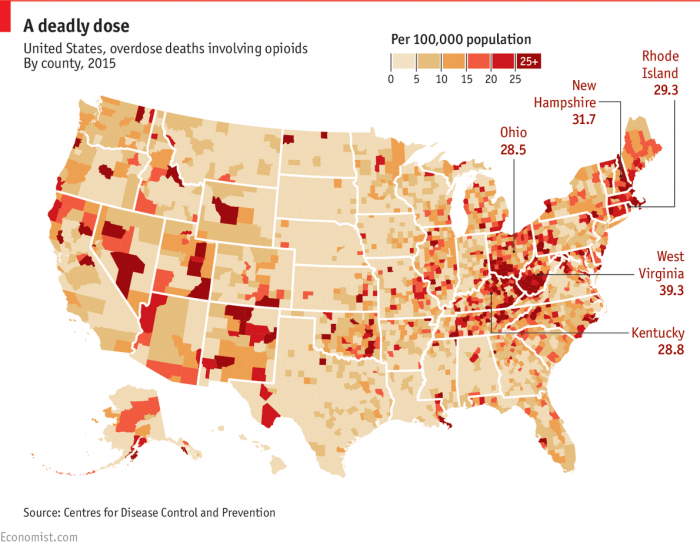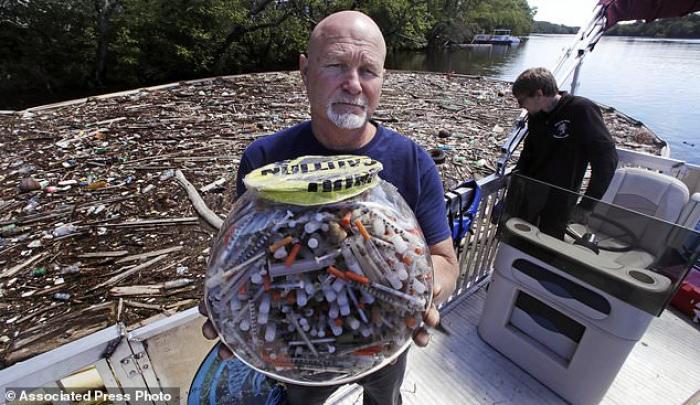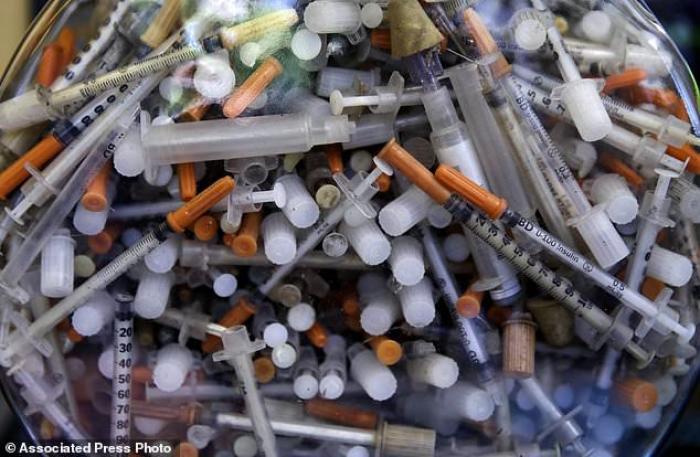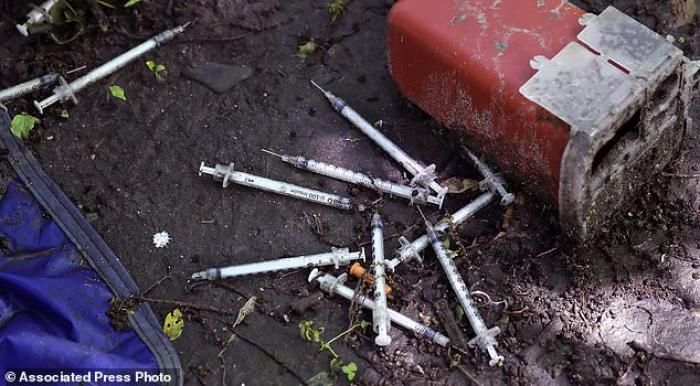The one NASTY reason why we can't take our children to parks anymore
FREE Catholic Classes
Many of us have participated in cleanup days where we join a group of friends and pick up litter at a local park. It's just something good people do to help keep their community beautiful. Sadly, those activities are becoming dangerous because heroin addicts are discarding needles by the thousands, a symptom of the growing opioid epidemic in the United States.

An addict huddles on the floor of a public restroom. Opioids cause the user to stop caring about things most people care about.
LOS ANGELES, CA (California Network) -- Americans have become craven, fearful of pain of any sort. In the past, pain was part of life. There were pains from old age, pain from illness, and emotional pain from life itself. Pain is the fruit of sin, and the curse of Eve. However, we have always understood that part of the experience of life includes pain, and we have endured it.
In recent decades, we have come to shun and avoid pain, and where we find it, we seek to kill it immediately. Painkilling drugs are everywhere. Just like the dystopian society in Brave New World, we now take drugs to avoid any kind of suffering. The problem with this strategy is that we don't cure the pain, we simply spread it to others.
Heroin is a classic example. Heroin is an opioid painkiller. It's powerful and almost instantly addictive. It dulls physical pain and fogs the mind to the point a person loses all capacity to care about anything. Heroin is usually injected into the veins, and the needles are commonly left about rather than safely disposed. This is causing public restrooms and parks to become littered with needles.

The opioid epidemic in America is growing out of control.
Parks and restrooms have become dangerous places to take children. In the mornings, addicts can be found lying about from the night before. Police rarely intervene because the problem is so common. During the day, there is the risk of a child encountering a dirty needle.
A needle prick can be painful for a child, and it can transmit disease. Hepatitis, tetanus, HIV, or residual dope can be injected into a victim. Even if no disease is transmitted, people often need to undergo painful tests to ensure they haven't become infected.
Cleanup efforts focusing on needles have been launched across the country, in an attempt to keep up with the growing opioid epidemic.

Rocky Morrison, from the Clean River Project in Methuen, Massachusetts holds up a bowl of syringes he has found. The bowl provides a shocking example of how plentiful discarded needles are.
In 2015, more than 52,000 Americans died from opioid overdoses. This year, the number is on track to exceed 60,000. Along with the drugs comes the needles.

Needles are being discarded in parks, restrooms, hiking trails, and all manner of public spaces.
Police departments and EMT crews now carry Narcan, which is a nasal spray that counteracts the effects of opioid overdose. It's saving lives, but the fact that it is now part of every first responder's kit shows just how serious the epidemic has become.
Cleanup efforts have collected needles by the tens of thousands from public spaces where they threaten people and wildlife alike. In San Francisco alone, over 13,000 needles were collected during a cleanup effort in March.

Children commonly find discarded needles and play with them, unaware of the danger they pose. Even if they don't catch a disease, they still need painful tests to assure their safety.
These numbers do not include those needles that are properly disposed of, and those that are gathered in people's homes. Include those numbers, and the epidemic is far, far worse.
We are poisoning ourselves because we have been conditioned to be terrified of pain. But pain is part of the experience of living. We need to rethink our attitude towards pain, and we need to provide paths back to health and well-being for people tempted to do drugs. We need programs to keep our public spaces clean. And we need to prosecute with all the resources of war, those who would poison us with their dope. Anyone who traffics in such poison must be punished beyond recidivism. Only then will our parks and public spaces be safe again.
Subscribe Now - Catholic Online YouTube
---
'Help Give every Student and Teacher FREE resources for a world-class Moral Catholic Education'
Copyright 2021 - Distributed by Catholic Online
Join the Movement
When you sign up below, you don't just join an email list - you're joining an entire movement for Free world class Catholic education.
-

-
Mysteries of the Rosary
-
St. Faustina Kowalska
-
Litany of the Blessed Virgin Mary
-
Saint of the Day for Wednesday, Oct 4th, 2023
-
Popular Saints
-
St. Francis of Assisi
-
Bible
-
Female / Women Saints
-
7 Morning Prayers you need to get your day started with God
-
Litany of the Blessed Virgin Mary
Daily Catholic
 Daily Readings for Monday, November 25, 2024
Daily Readings for Monday, November 25, 2024 St. Catherine of Alexandria: Saint of the Day for Monday, November 25, 2024
St. Catherine of Alexandria: Saint of the Day for Monday, November 25, 2024 Guardian Angel Prayer #3: Prayer of the Day for Monday, November 25, 2024
Guardian Angel Prayer #3: Prayer of the Day for Monday, November 25, 2024- Daily Readings for Sunday, November 24, 2024
- St. Andrew Dung Lac: Saint of the Day for Sunday, November 24, 2024
- Prayer for Protection against Storms and Floods: Prayer of the Day for Sunday, November 24, 2024
![]()
Copyright 2024 Catholic Online. All materials contained on this site, whether written, audible or visual are the exclusive property of Catholic Online and are protected under U.S. and International copyright laws, © Copyright 2024 Catholic Online. Any unauthorized use, without prior written consent of Catholic Online is strictly forbidden and prohibited.
Catholic Online is a Project of Your Catholic Voice Foundation, a Not-for-Profit Corporation. Your Catholic Voice Foundation has been granted a recognition of tax exemption under Section 501(c)(3) of the Internal Revenue Code. Federal Tax Identification Number: 81-0596847. Your gift is tax-deductible as allowed by law.







 Daily Readings for Monday, November 25, 2024
Daily Readings for Monday, November 25, 2024 St. Catherine of Alexandria: Saint of the Day for Monday, November 25, 2024
St. Catherine of Alexandria: Saint of the Day for Monday, November 25, 2024 Guardian Angel Prayer #3: Prayer of the Day for Monday, November 25, 2024
Guardian Angel Prayer #3: Prayer of the Day for Monday, November 25, 2024

